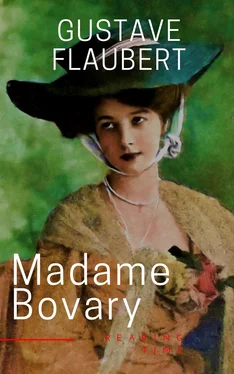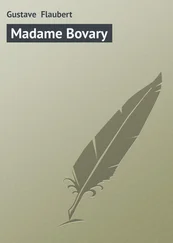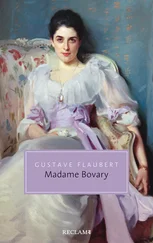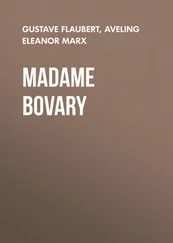Table of Contents
Madame Bovary
Gustave Flaubert
Part 1 Part 1
Chapter 1
Chapter 2
Chapter 3
Chapter 4
Chapter 5
Chapter 6
Chapter 7
Chapter 8
Chapter 9
Part 2
Chapter 1
Chapter 2
Chapter 3
Chapter 4
Chapter 5
Chapter 6
Chapter 7
Chapter 8
Chapter 9
Chapter 10
Chapter 11
Chapter 12
Chapter 13
Chapter 14
Chapter 15
Part 3
Chapter 1
Chapter 2
Chapter 3
Chapter 4
Chapter 5
Chapter 6
Chapter 7
Chapter 8
Chapter 9
Chapter 10
Chapter 11
Madame Bovary
Gustave Flaubert
(Translator: Eleanor Marx-Aveling)
Published:1857 Categorie(s):Fiction, Literary
Part 1
We were in class when the head-master came in, followed by a "new fellow," not wearing the school uniform, and a school servant carrying a large desk. Those who had been asleep woke up, and every one rose as if just surprised at his work.
The head-master made a sign to us to sit down. Then, turning to the class-master, he said to him in a low voice—
"Monsieur Roger, here is a pupil whom I recommend to your care; he'll be in the second. If his work and conduct are satisfactory, he will go into one of the upper classes, as becomes his age."
The "new fellow," standing in the corner behind the door so that he could hardly be seen, was a country lad of about fifteen, and taller than any of us. His hair was cut square on his forehead like a village chorister's; he looked reliable, but very ill at ease. Although he was not broad-shouldered, his short school jacket of green cloth with black buttons must have been tight about the arm-holes, and showed at the opening of the cuffs red wrists accustomed to being bare. His legs, in blue stockings, looked out from beneath yellow trousers, drawn tight by braces, He wore stout, ill-cleaned, hob-nailed boots.
We began repeating the lesson. He listened with all his ears, as attentive as if at a sermon, not daring even to cross his legs or lean on his elbow; and when at two o'clock the bell rang, the master was obliged to tell him to fall into line with the rest of us.
When we came back to work, we were in the habit of throwing our caps on the ground so as to have our hands more free; we used from the door to toss them under the form, so that they hit against the wall and made a lot of dust: it was "the thing."
But, whether he had not noticed the trick, or did not dare to attempt it, the "new fellow," was still holding his cap on his knees even after prayers were over. It was one of those head-gears of composite order, in which we can find traces of the bearskin, shako, billycock hat, sealskin cap, and cotton night-cap; one of those poor things, in fine, whose dumb ugliness has depths of expression, like an imbecile's face. Oval, stiffened with whalebone, it began with three round knobs; then came in succession lozenges of velvet and rabbit-skin separated by a red band; after that a sort of bag that ended in a cardboard polygon covered with complicated braiding, from which hung, at the end of a long thin cord, small twisted gold threads in the manner of a tassel. The cap was new; its peak shone.
"Rise," said the master.
He stood up; his cap fell. The whole class began to laugh. He stooped to pick it up. A neighbor knocked it down again with his elbow; he picked it up once more.
"Get rid of your helmet," said the master, who was a bit of a wag.
There was a burst of laughter from the boys, which so thoroughly put the poor lad out of countenance that he did not know whether to keep his cap in his hand, leave it on the ground, or put it on his head. He sat down again and placed it on his knee.
"Rise," repeated the master, "and tell me your name."
The new boy articulated in a stammering voice an unintelligible name.
"Again!"
The same sputtering of syllables was heard, drowned by the tittering of the class.
"Louder!" cried the master; "louder!"
The "new fellow" then took a supreme resolution, opened an inordinately large mouth, and shouted at the top of his voice as if calling someone in the word "Charbovari."
A hubbub broke out, rose in crescendo with bursts of shrill voices (they yelled, barked, stamped, repeated "Charbovari! Charbovari"), then died away into single notes, growing quieter only with great difficulty, and now and again suddenly recommencing along the line of a form whence rose here and there, like a damp cracker going off, a stifled laugh.
However, amid a rain of impositions, order was gradually re-established in the class; and the master having succeeded in catching the name of "Charles Bovary," having had it dictated to him, spelt out, and re-read, at once ordered the poor devil to go and sit down on the punishment form at the foot of the master's desk. He got up, but before going hesitated.
"What are you looking for?" asked the master.
"My c-a-p," timidly said the "new fellow," casting troubled looks round him.
"Five hundred lines for all the class!" shouted in a furious voice stopped, like the Quos ego*, a fresh outburst. "Silence!" continued the master indignantly, wiping his brow with his handkerchief, which he had just taken from his cap. "As to you, 'new boy,' you will conjugate 'ridiculus sum'** twenty times."
Then, in a gentler tone, "Come, you'll find your cap again; it hasn't been stolen."
*A quotation from the Aeneid signifying a threat.
**I am ridiculous.
Quiet was restored. Heads bent over desks, and the "new fellow" remained for two hours in an exemplary attitude, although from time to time some paper pellet flipped from the tip of a pen came bang in his face. But he wiped his face with one hand and continued motionless, his eyes lowered.
In the evening, at preparation, he pulled out his pens from his desk, arranged his small belongings, and carefully ruled his paper. We saw him working conscientiously, looking up every word in the dictionary, and taking the greatest pains. Thanks, no doubt, to the willingness he showed, he had not to go down to the class below. But though he knew his rules passably, he had little finish in composition. It was the cure of his village who had taught him his first Latin; his parents, from motives of economy, having sent him to school as late as possible.
His father, Monsieur Charles Denis Bartolome Bovary, retired assistant-surgeon-major, compromised about 1812 in certain conscription scandals, and forced at this time to leave the service, had taken advantage of his fine figure to get hold of a dowry of sixty thousand francs that offered in the person of a hosier's daughter who had fallen in love with his good looks. A fine man, a great talker, making his spurs ring as he walked, wearing whiskers that ran into his moustache, his fingers always garnished with rings and dressed in loud colours, he had the dash of a military man with the easy go of a commercial traveller.
Once married, he lived for three or four years on his wife's fortune, dining well, rising late, smoking long porcelain pipes, not coming in at night till after the theatre, and haunting cafes. The father-in-law died, leaving little; he was indignant at this, "went in for the business," lost some money in it, then retired to the country, where he thought he would make money.
But, as he knew no more about farming than calico, as he rode his horses instead of sending them to plough, drank his cider in bottle instead of selling it in cask, ate the finest poultry in his farmyard, and greased his hunting-boots with the fat of his pigs, he was not long in finding out that he would do better to give up all speculation.
Читать дальше











